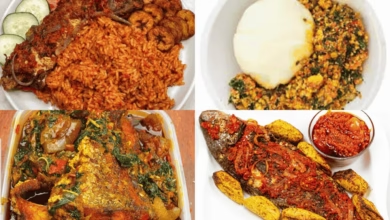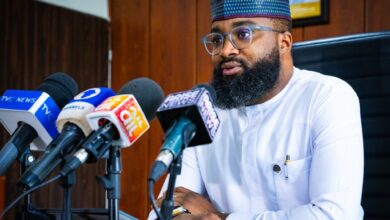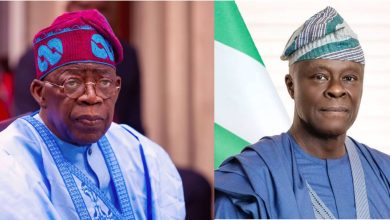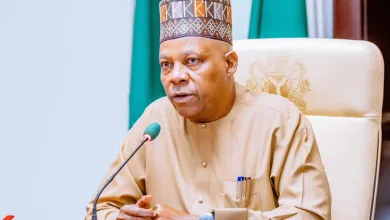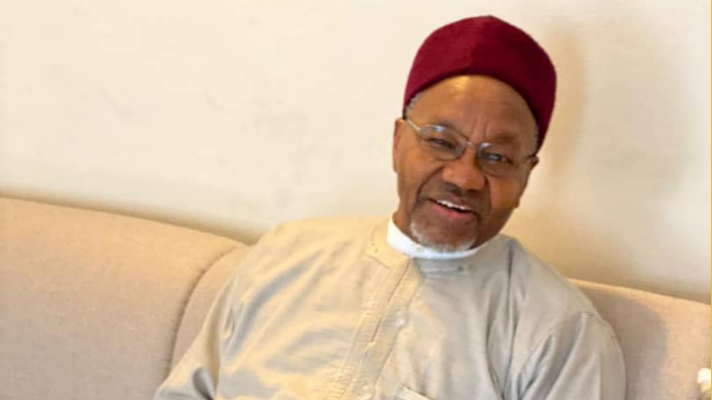
“To be like the rock that the waves keep crashing over. It stands unmoved and the raging of the sea falls still around it.” – Marcus Aurelius
Today, I pay tribute to an extraordinarily special man. A humble human being who is fazed neither by criticism nor by praise. A gentleman who is unperturbed by fortune or loss. An individual who is content with little and unimpressed by wealth, power or position. A person who is averse to publicity and showmanship; self-effacing; austere and always simply dressed — customarily in white.
This man lives a simple life that is far from the garish and the gaudy; which is exemplified by his casual, but certain, non-judgemental disdain for the ostentatious. Today, I celebrate a man that I am proud to call my father, Malam Mamman Daura.
This tribute is about my father, ‘My Baba’, the real Malam Mamman Daura: son, husband, father, and grandfather. The actual version. The authentic version. The one that exists in real life — who has touched many lives in his unassuming way. Not the sponsored-social-media-created version who is preposterous and larger-than-life.
As Baba himself would say when we would express concern about the persistent and unjustified character assassination of his person – “Do not worry. If Allah knows the truth; that is all that matters.” I would want to provide another perspective — the genuine perspective and a true portrayal of the man my father is. This account stems from who and what my siblings and I, and our mother know him to be…
My Baba is a simple, yet, complex man. A man of a few words — which often makes him come across as standoffish. He is highly engaging when he is in his comfort zone – with family and a few close friends. With his late younger brother Baba Sani, I recall with such fondness their daily raucous and wheezy-asthmatic laughing sessions as they shared their inside-jokes. Both men would always end up dissolving into laughter — like old car engines, —whenever they were in the same room.
Baba is conservative, yet liberal. Conservative in his political leanings and gender roles at the home front. However, he is the perfect gentleman. He is chivalrous to a fault, and a gracious human being, who personally serves others food before serving himself —whenever they eat at his table.
The conservative that Baba is makes his public displays of affection extremely rare — atypical of northern men in his age group. However, from his consistent actions and teachings over the years, we have never doubted that he loved us.
If you make the mistake of telling Baba you have a headache, he will continue to ask you about that same headache for many days. When we were younger, there was no limit to how he would play and engage us when he was available and otherwise preoccupied. He would play ‘Riyo-riyo’ with us – a game where we would all hold hands and form a circle and sing ‘Riyo-riyo, o ririyo gib’ and then put our right feet forward into the circle with a thump. This was done continuously and when he sang ‘Riyo riyo o ririyo kwangarya’ we were all supposed to stamp our right feet out of the circle. The person who made the mistake of thumping his or her right feet inside the circle would be laughed at. Nevertheless, there were no winners or losers in this game, which was played in two sets of three, two and one. Of course, being young children at the time, Baba could not keep up with our energy and would stop the game after a while.
During Sallah (Eid) celebrations we would have lalle (Henna) applied on our hands and feet – and oh did Baba despise the smell of lalle! With such irreverence, we would shove our lalle dyed feet unto Baba’s nose and face and he would struggle to push us away. When we would not stop, he would grab us and rub the stubs on his freshly shaven chin on our faces and foreheads; prickling our fresh cherubic faces, and we would scream and that was how he would finally get rid of us. However, when he was not in the mood, as you entered his living room, one piercing glare was enough, or without saying a word, he would point to the door and we would immediately leave. When we did not get the message, or when he was expecting visitors, he would say to us “Make yourselves scarce!” — and we would subsequently take flight.
Once we started to grow up, Baba’s conservatism set in. He no longer used to hug us when he returned from trips. We no longer used to rush to say ‘Baba oyoyo!’ It became a more measured ‘Baba sannu da zuwa’, sometimes with a handshake. By the time I was 17 years old, I had gotten used to not hugging Baba. For the first time in my life, I had not seen my father in 8 months at a stretch when I went to college after secondary school. When Baba came in, instinctively, I rushed to hug him — forgetting that I had stopped that habit many years earlier. Baba held me by the shoulders and said to me “You are much too large for this!” stopping me in my tracks. We both laughed over it.
Baba is also liberal – in the sense that he married only our mother — when polygamy was the norm for his demographic group. Together they had six of us – five females, and a male. In our household, there was always a sense of equality in the rights, privileges and disciplinary actions — especially in the educational opportunities afforded to all of us. My brother often mentioned when we were growing up that once his friends or acquaintances realised that he was the only male child, they assumed that he was treated with higher regard – which he always countered with much conviction that it was indeed the reverse case. During our weekly special family lunches at home, usually on Fridays or Saturdays, with food from the Arewa Chinese restaurant, he would always be the last to eat — after he had served our mother, the girls, then our brother — he would then serve himself.
Baba never once talked or pressured me nor any of my four sisters about marriage. He allowed me to get married by my choice and on my terms – just before I turned 26, and after I had completed my master’s degree, national service and working for nearly two years.
Not outrightly religious, Baba has lived and continues to live the exemplary life of sabr (patience), shukr (thankfulness) and tawakkul (trust in God) – the core virtues of the Islamic faith. Baba is also of impeccable rectitude – honest and decisively upright but is neither sanctimonious nor overcritical. Mama has told me how one of his childhood friends frequently re-iterated to her “Mamman duk ya fi mu” (Mamman is better than all of us).
In the 1980s and 1990s, he was honoured several times by the Kaduna State Government for consistency in remitting the rightful amount of corporate taxes as well as personal income taxes. Because he declared and paid the correct amount of personal income taxes in amounts much more than people of known stupendous wealth did — he was generally thought to be much wealthier than he really was. He served as the Chairman of a Committee during the 1994 Constitutional Conference – which lasted almost one year; and when the conference ended, committee members and chairpersons were allocated choice residential plots in Abuja by the then Federal Government. Baba rejected the plot given to him – citing that he had served his country and that he was adequately remunerated with accommodation and sitting allowances and therefore did not deserve the plot. He also indicated that he did not need the plot. Until today, this is the essential character of my father – not bothered much about asset acquisition, or the things that he does not ‘need’. In conversations I have had with him over the years, he has hinted to me that if one makes the pursuit of money and material things one’s focus, then one would never have peace. Baba’s motivation was always on setting up industries – to create jobs and accelerate development; but not primarily to create personal wealth.
Not one given to socialising, Baba is almost always at home with his family. He is either found reading in his study or sitting alone in his living room in deep thought or with his television tuned to the news, sports, documentaries or nature channels. Occasionally he watches classic movies – he especially enjoys watching British Classics like Laurel and Hardy, Charlie Chaplin, Mind Your Language and the Carry On series. In the afternoons, you would usually find him — to use his exact words — “watching an enthralling game of cricket and sipping on a spiffing cup of English tea!” He calls Darjeeling ‘the Rolls Royce of Teas.’
Growing up, we had the best of times. Baba worked extremely hard and for long hours and was a prosperous industrialist with major stakes in textiles, manufacturing and banking – so we lacked nothing. While he did not care so much for material things, he gave us the best of everything. As little kids, we would often fly First Class to London on the then British Caledonian Airways and lodge at The Churchill Hotel. So these days, when I have to plan to purchase an economy ticket to London, I think back and I am grateful for what I had as a child. In the mid-80s, we would vacation in Nice (the south of France) and Amsterdam. Perhaps because Baba grew up with so little, often going days without much food, he spared nothing to ensure our utmost comfort. If not for our mother’s corrective spankings and strictness, I think we would have turned out utterly spoilt brats! Thankfully and for our own good, Mama did not give in to his pleads to stop spanking us when we were naughty. We really did have the best of everything; but most importantly, we had love! Baba did all this to please us, but he was and is still not one to be affected or controlled by worldly things. Contrary to popular opinion, Baba possesses neither millions in bank accounts nor choice properties in Abuja or anywhere else – in fact, he owns only two houses – his family homes in Kaduna and Daura.
A minimalist, Baba’s choice of clothing has always been modest. Since mobile phones came into existence, he stopped wearing watches. When he used to wear watches – he wore a simple, leather bracelet timepiece. Most of Baba’s personal staff have been with him for 20, 30 and even up to 40 years. Many of them only leave when they get too old or when we were separated by the cold hands of death – a confirmation of his kindness, generosity and magnanimity.
The quintessential stoic, Baba is unruffled by provocation. I doubt that in my 40 plus years of existence, I have heard him raise his voice or blurt out invectives or harsh reprimands even when justified. Baba never shouts at anyone —his aides and domestic workers inclusive. I remember when I got married and Baba was giving me final words of advice before my departure from home and as I sobbed he said to me “ki yi hakuri, ki yi kamar Maman ki. Shekaru talatin da muke tare bamu taba fada ba” (Be patient like your mother, we have never fought in the 30 years (then) that we had been together). I was shocked! When I was younger, I truly believed that they never used to fight or disagree at all — and I cannot thank them enough for that – for that is a great gift to give to your children.
As I grew older, I understood that there was no way a marriage would have no conflict, and that they just did a good job in hiding theirs from us. A few weeks after I got married, I asked my mother if they had never fought before – and she said that he was telling the truth. She said that it was not because there were no avenues for quarrels, but because he would just not let the quarrels to occur. She told me that there were conflicts of course and disagreements, but he had never raised his voice at her or engaged her in a squabble. She also said that she would sometimes intentionally provoke him just to get a reaction, but the dignified gentleman would just not budge! Ka ji Maza!
Baba’s sense of humour is legendary – and his use of adjectives unparalleled. He is at his best when he playfully dishes out abuses at us – when you put on weight he would whisper not to you but to another sibling “X tayi yi monumental kiba” (X has put on monumental weight) or say with much gender insensitivity “you are growing in all directions.” About an extremely corrupt figure, he would say, “dedicated thief”, when you irritate him, he would call you a “confounded nuisance.” One of Baba’s favourite sayings is “if you pay peanuts, you get monkeys to work for you” – to stress that if a job pays very little, it attracts the least competent hands. I remember many years ago, I was reading a poorly written article – almost unintelligible due to the numerous grammatical, spelling and every conceivable error inherent, and he said to me – “If you read that article to the end, it will un-educate you!”
Baba once told me that sometime in the late 1970s, when he was the Editor of the New Nigerian newspaper, he conducted what he described as a highly engaging interview with the late Alhaji Mamman Shata – arguably the most renowned and most prolific Hausa singer and griot. He then wrote what he said was one of the best articles of his writing career – full of praise for Mamman Shata as he was memerised by the singer’s personality – his quick wit, talent, humour and general take on issues. At the last minute, he said that he stopped the article’s publication because, again, in his exact words: “bani so ya yi mani waka!’’ (I do not want him to sing [a panegyric] for me)
As a son, Baba adored his late father – Alhaji Dauda Daura (Alhaji Babba), the first Durbin Daura (The Durbi of Daura). Alhaji Babba was of Kanuri ancestry; after an infamous family feud, his great grandparents and other family members migrated from Kukawa in northern Borno to Mirriah in Niger Republic with some finally settling in Daura. Baba used to call his father ‘Alhaji nawa’ (my Alhaji) as if he was his alone. He would call Alhaji Babba every single day or night without fail when landlines were finally operational in Daura. As one of us (children) entered his living room, he would blurt out with much emphasis – zero (pronounced zee-ye-ro in an exaggerated Queen’s English manner) six-five, and then whoever it was would complete with ‘five-seven-zero-zero-six (065-57006) – also mimicking the zee-ye-ro pronunciation. It was an instruction to go to the telephone and keep dialing until the line went through to Daura and to ‘his Alhaji’. Those under 35 years may not remember those telephones where dialing required ringing the numbers round and round and the difficulty we endured in those days with getting connected to other states, especially the rural areas. When Alhaji Babba’s health failed, and after an unsuccessful medical trip to the UK, Baba brought him back to Kaduna to our home where he was nursed until he passed away in October 1993. His death took a toll on Baba – he lost considerable weight and bore a sad countenance for many months. After the Durbi’s passing, the then Sarkin Daura (Emir of Daura), late Muhammadu Bashar conferred Baba with the title of Durbi – much to his chagrin as he despises anything that brings attention to himself and most especially the pomp that accompanies royal titles. Up until today, over 25 years since the title was conferred upon him – the official turbaning has not be done; due to Baba’s reluctance. When my mother wants to provoke him, albeit jokingly, she would call him Durbi, and he would give her the side glare, and she would laugh aloud while he would maintain a straight face!
With his mother – Hajjá Sa’a, being her first surviving child and her being a Fulani woman, she was not expected to show him much affection and she did not. He spent more time with his paternal grandmother than he did with his mother and therefore was not very attached to her as his other siblings were. I observed their relationship to be very formal, but it was obvious how proud of her son she was. Just like Alhaji Babba, Baba would also do anything for his mother – never going against her will. I believe that I made up for the closeness lacking in their relationship, as I was the apple of her eye – the warmth and affection that she was unable to show to her son; she showered on me. I think Baba inherited her sharp intellect. Hajja Sa’a was also a woman of few words. However, when she did speak; she demonstrated incredible wordsmithery and the ease and speed at which she would add and subtract large numbers indicated what a mathematical genius she would have been had she gone to formal school. Hajja Sa’a died in September 1996 in Daura after a very brief illness.
Growing up, while Baba was not one to play music (although he told me that he once had an enviable collection of classical music records and classic Hausa music tapes); without realizing, we made a lot of good acapella music with him as the composer and lead singer and us as the background choristers, the ‘yan amshi. When things did not go the way we expected them to, Baba would often sing the words of Jan Kidi to us:
‘’Wata rana a sha zuma,
wata rana a sha madaci,
haka duniya ta ke,
Jaafaru mai halin mazan jiya; zauna da lafiya, mai kuli-kuli kawo na dari….’’ (Sometimes life offers us honey, sometimes life gives us bitters, that is how life is….).
These words have made an indelible mark on my psyche in my formative years, and as I have grown older, I have fully grasped the weight of those words. Whenever things do not go my way, or when they do go my way, I find myself singing “wata rana a sha zuma, wata rana a sha madaci….’’ and I feel so much better or I restrain my joy as the case may be. Baba would also often make us chant after him “may I never rest, until my good is better and my better best” – subtly, without us realising that he was instilling the spirit of excellence and strong work ethic in each and every one of us (his children). Baba taught us contentment – he would habitually say and make us repeat after him “If you can’t have what you want; want what you have.” When it was time for prayers, he would sing “haramar sallah” (prepare to pray) and we would all chorus “alwala” (ablution) – repeatedly as we all marched in different directions (to perform the ablution) only stopping the chants when we were out of sight of each other. Up to this day, Baba still sings haramar sallah to announce that it is time for prayers.
The most important lesson that I have learnt from my father is patience. Patience in adversity, patience in moments of lack and patience with the vicissitudes of life. In the early 2000s, Baba demonstrated uncommon patience. With the new government reforms, industries collapsed and all of Baba’s business interests suffered a major blow. He went from having so much to having very little or at times even nothing at all – but he persevered. Year in and year out, things got only worse; but Baba accepted this fate with utmost grace – showing not an ounce of bitterness; and for this, he has my eternal reverence. Allah tells us that ‘’Verily, with hardship comes ease’’ (Qur’an 94:5) and indeed; with hardship came ease.
Finally, as the saying goes, “The greatest gift a father can give his children is to love their mother” and Baba has indeed shown Mama what unconditional love is – in words and deeds, in spite of his conservatism and intrinsic inability or more appropriately shyness in showing physical public displays of affection. My parents do have an enviable relationship – up until today, one of their favourite past times is writing palindromes. Baba would write the first sentence in capital letters and underline and Mama would complete with several verses underneath and you would find that sheet of paper casually lying around on a table or stool in Baba’s living room. Baba would come back from an unusual trip to the grocery store and buy Mama a pack of Kellogg’s Special K cereal which she loves and would say to her “here is some Special K for a special K” (in reference to her second name Kulthum). It would make her happy to no end – basking in the euphoria of a woman who knew her husband adores her.
They say nobody is perfect, but how perfect you are to me Baba! Happy 80th to a distinguished gentleman. Babarbare mai halin Fulani! Durbin Daura! Papi! The estimable, the inestimable Baba! It is an incredible honour to be your daughter.
Ni ce, Fatima tim tim.
Post Scriptum
Malam Mamman Daura was born on the 9th of November, 1939 in Daura. He had his basic education at the Katsina Middle School and Secondary Education at the Government College, Okene.
In the late 1960s, he was sent to the UK for higher education by the then Northern Regional Government as part of a small cohort of brilliant young northern men chosen by the late Sardauna of Sokoto, Sir Ahmadu Bello. Malam Mamman Daura studied English Language, English Literature, Latin and British Constitution at Advanced Level at Bournemouth College. He was then admitted to the elitist Trinity College, Dublin (The Irish equivalent of Oxbridge) and received a Bachelor’s degree in Economics and Politics and a combined Masters degree in Public and Business Administration. He returned home and joined the mainstream civil service. He subsequently moved to the New Nigerian Newspapers as Editor and eventually becoming its Managing Director. Thereafter, he left to set up a private industry – The Kaduna Furniture and Carpets Company (KFCC) which was at one time the largest furniture manufacturing company in West Africa.
Malam Mamman Daura was a key driver of the first northern Nigerian industrial revolution of the late 1970s and 1980s; with local and international partners and investors – setting up and managing the following industries: Kaduna Aluminium Ltd, Kaduna Machine Works, United Nigeria Textiles Ltd (UNTL), Funtua Textiles (FTL), Arewa Textiles, Nortex and Finetex. He was at various times a director or board member, managing director or chairman of Hagameyer, Dunlop, African International Bank and APICO Insurance. He also played a key role in the management of the Northern Nigeria Development Company (NNDC), Nigeria Television Authority (NTA) and Al-Huda Huda Printing Press. He was until recently, an active member of the philanthropic organisation – Gidauniyar Jihar Katsina (Katsina State Development Fund). His political affiliations over the Republics are: the Northern People’s Congress (NPC), National Party of Nigeria (NPN), National Republican Convention (NRC), People’s Democratic Party (PDP), All People’s Party (APP), All Nigeria People’s Party (ANPP), Congress for Progressive Change (CPC) and the All Progressives Congress (APC).
He is married to Hajia Ummu Kulthum and together they have 5 daughters, 1 son and 14 grandchildren.

